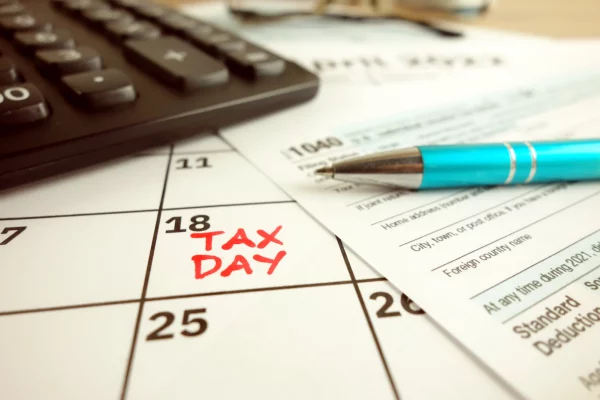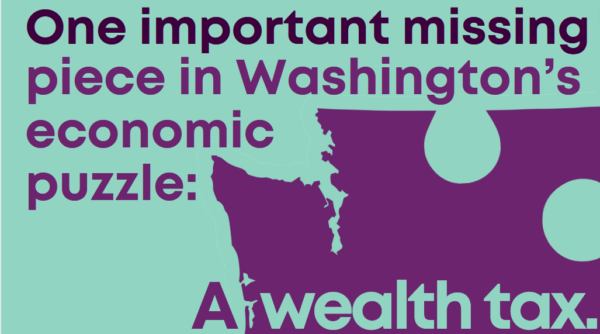Tax day is a day that inspires lots of feelings.

Due to Washington’s lack of an income tax, we don’t have to file a Washington state return on Tax Day. So, many of us spend our time while filing taxes thinking about federal taxes and the federal government. But we think it’s a good day to check in with our feelings about this Washington’s tax code: the good, the bad, and the ugly.
The good? Our state and local tax dollars keep our public schools, colleges, and universities open, our roads safe, and our parks beautiful.
We pitch in our share through state and local taxes to fund these public programs and services that we love and rely on. Our tax system is something we all participate in and should have expectations for. Our taxes ought to work well for all of us, both terms of how much we pay and what they pay for in our communities.
The bad? Unfortunately, Washington’s tax code isn’t working well for us.
In fact, Washington’s tax code is the most regressive in the country. Our state raises half of its public revenue from the sales tax, which is about 10% (state + local sales tax) and applied to most purchases, including online purchases. Unlike the federal income tax, where you see in one place how much you’ve paid each year, we don’t get a tax bill for all the sales tax we’ve paid. In this way, our state tax bill is obscured from our view, so we cannot easily see how much we’ve paid individually or the inequities and unfairness of the whole system. Washington’s tax structure places a bigger burden on low income residents than its wealthiest. Those with the lowest incomes in Washington pay at least 4 times more in state and local tax than the wealthiest in terms of their share of yearly income.
The ugly? It gets worse.
Not only is our tax code unfair, asking working people to subsidize our public programs and services more than the wealthiest, but Washington’s tax code also perpetuates wealth and racial inequality. In its recent ruling on the capital gains tax, the state Supreme Court recognized the racist impacts of our tax code: “The wealthiest households in Washington are disproportionately white, while the poorest households are disproportionately BIPOC. As a result, Washington’s upside-down tax system perpetuates systemic racism by placing a disproportionate tax burden on BIPOC residents”
In our current system, the wealthiest in Washington – we’re talking 100 or so billionaires – get to grow their wealth tax free. Unlike our homes that are taxed annually on their value through the property tax, billionaires’ wealth held in financial assets like stocks and bonds isn’t taxed at all. We are subsidizing some of the wealthiest people in the world and leaving huge amounts of resources on the table with this current system. The result? Our tax code, which is so reliant on taxing working people, isn’t able to raise enough revenue. Which means state lawmakers cannot fully fund (or fund at all) the important programs and services that would make our lives better. For instance, this legislative session (which is wrapping up at the end of April) saw lawmakers say no to providing free school lunch to all public school students due to lack of funds.
This Tax Day, it’s ok to feel the feelings.
 But we hope that one thing we think about this Tax Day is that we are not passive spectators to this current inequitable and inadequate system. Our lawmakers, who we elect, can make different policy choices that mean a brighter future for all of us in Washington. One thing they can do to improve the system is to pass a state wealth tax on multi-millionaires and billionaires. A modest 1% tax on financial property worth more than $250 million would raise billions of dollars a year from the wealthiest people in our state – some of whom are some of the wealthiest people in the entire world. Our tax dollars should work to keep our state and the people in it thriving. To achieve this, our current system must do much, much better.
But we hope that one thing we think about this Tax Day is that we are not passive spectators to this current inequitable and inadequate system. Our lawmakers, who we elect, can make different policy choices that mean a brighter future for all of us in Washington. One thing they can do to improve the system is to pass a state wealth tax on multi-millionaires and billionaires. A modest 1% tax on financial property worth more than $250 million would raise billions of dollars a year from the wealthiest people in our state – some of whom are some of the wealthiest people in the entire world. Our tax dollars should work to keep our state and the people in it thriving. To achieve this, our current system must do much, much better.
More To Read
January 17, 2025
A look into the Department of Revenue’s Wealth Tax Study
A wealth tax can be reasonably and effectively implemented in Washington state
September 24, 2024
Oregon and Washington: Different Tax Codes and Very Different Ballot Fights about Taxes this November
Structural differences in Oregon and Washington’s tax codes create the backdrop for very different conversations about taxes and fairness this fall
July 19, 2024
What do Washingtonians really think about taxes?
Most people understand that the rich need to pay their share

Andrea Faste
How is it that our tax code, year after year, never gets a chance to change in favor of the poor? Who are the big lobbyists who repeatedly prevent a “wealth tax” from passing?
Apr 29 2023 at 8:45 AM
Andrea Faste
We had a good tax reform bill in this Legislative session. Who prevented this bill from happening?
Apr 29 2023 at 8:46 AM